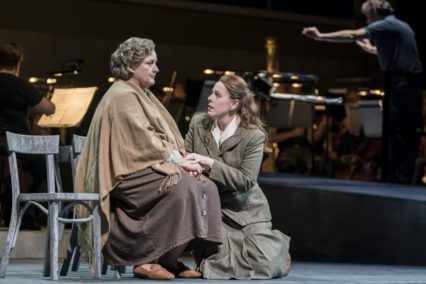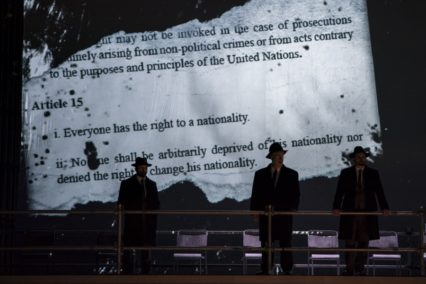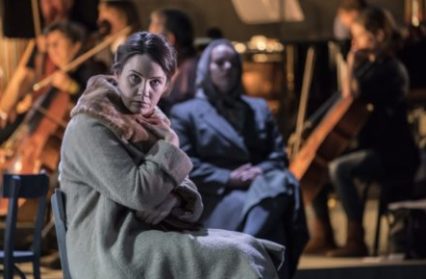Cath Barton travelled to the Donald Gordon Theatre, Wales Millennium Centre to witness a WNO production of Gian Carlo Menotti’s The Consul – part of WNO’s Summer Freedom Season.

David Pountney’s farewell as Artistic Director of Welsh National Opera is unashamedly political, a summer season focusing on human rights. The production of Gian Carlo Menotti’s 1949 opera The Consul included in the FREEDOM season is semi-staged, but director Max Hoehn sacrifices none of the drama of this tale of oppression.
Here, as so often, individuals are at the mercy of hidden forces. In an unnamed totalitarian state, a man, John Sorel, is on the run from the police. His wife Magda makes repeated visits to a consulate to apply for a visa to leave the country and, hopefully, join him. She never manages to see the consul, obstructed by an officious secretary. The opera ends in tragedy.
The story can be translated at any time. It is as relevant now as it was post-World War II when, immediately after its première in Philadelphia, The Consul ran on Broadway for 269 performances, was staged throughout Europe, translated into a dozen languages and was awarded the 1950 New York Drama Critics’ Circle Award for the best musical play, as well as the Pulitzer Prize for Music.
These days it is rarely performed. While its theme remains powerful, its music is a curious mixture of romanticism, film noir and pre-minimalism. And, overall, Menotti’s music has not found an enduring place in the operatic repertoire, with the exception of his 1951 one-act opera for children Amahl and the Night Visitors, the sentimental story of the three kings visiting the infant Jesus which is still performed widely in the US at Christmas-time.

There is, though, something at the core of The Consul which justifies its inclusion in Pountney’s Summer FREEDOM season, and that is focused in Magda’s Act II aria ‘To This We’ve Come’, in which she sings of her despair at being unable to get access to the consul. It is a plea from the powerless to the unseen ones who hold power over them – ‘who are these dark archangels?’ she sings. Soprano Giselle Allen, in the role of Magda, gave a vocally powerful and moving performance, here and throughout.
This area is an example of the way in which art can still convey a political ‘message’ to those of us who have become cynical in the face of fake news and the numbing effect of TV images. Words and music, conveyed by a committed singer, touch us in a way that our daily media cannot. They remind us of what the French writer Antoine de Saint-Exupèry’s Little Prince said: ‘It is only with the heart that one can see rightly; what is essential is invisible to the eye.’
It was, I think, largely the commitment of the performers, with clear direction, together with the projected video footage and images courtesy of The Wiener Library for the Study of the Holocaust and Genocide, which made the opera as a whole remarkably compelling in spite of the unevenness of Menotti’s score. Gary Griffiths and Catherine Wyn-Rogers gave strong performances as John Sorel and his mother, Richard Weigold was a suitably threatening Secret Police Agent and Peter Hoare as The Magician convinced with his distractions. Leah-Marian Jones, as the obstructive Secretary, was coquettish in a slightly disturbing way.
Roles of others waiting to see the consul gave opportunities to young singers Themba Mvula, Chanae Curtis, Freya Holliman and Sophie Dicks. Daniel Grice completed the vocal ensemble efficiently. The WNO orchestra – conducted here by Justin Brown – were on stage and, with most of the action in front of the players, audibility and balance of sound was excellent.
The website for the Welsh National Opera will have all updates about their future and current productions.
Cath Barton won the New Welsh Writing AmeriCymru Prize for the Novella with The Plankton Collector, which is published by New Welsh Review under their Rarebyte imprint. Her second novella will be published by Louise Walters Books in 2020, and in early 2021 Retreat, West Books will publish her collection of short stories inspired by the work of the Flemish artist Hieronymus Bosch.
Header Image: WNO The Consul; Sophie Dicks Vera Boronel – Photo credit Johan Persson



 Enjoyed this article? Support our writers directly by buying them a coffee and clicking this link.
Enjoyed this article? Support our writers directly by buying them a coffee and clicking this link.







